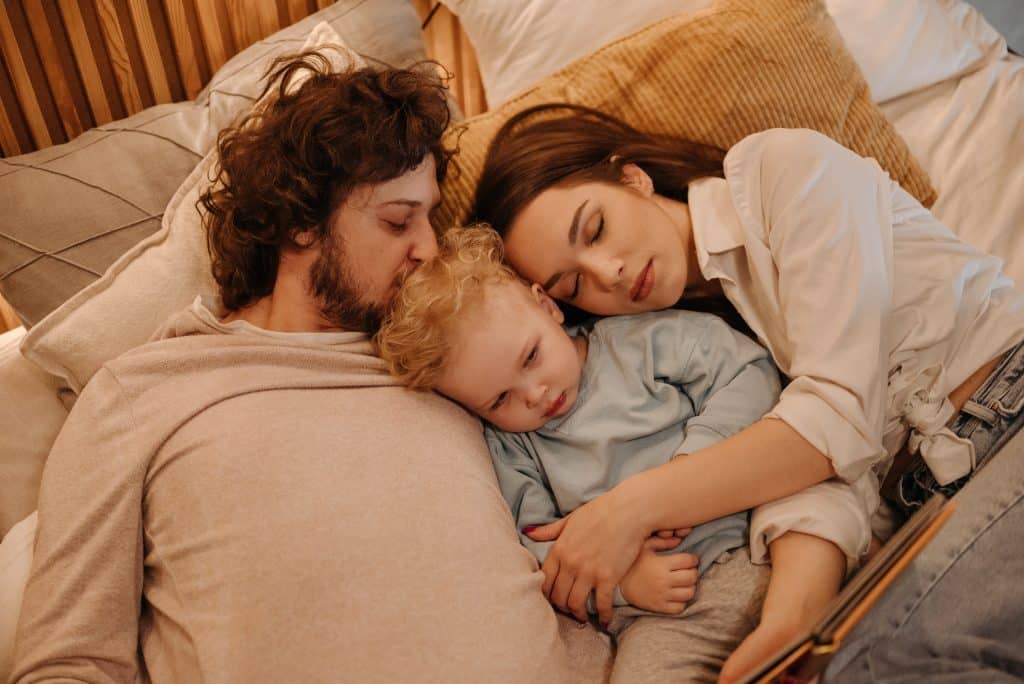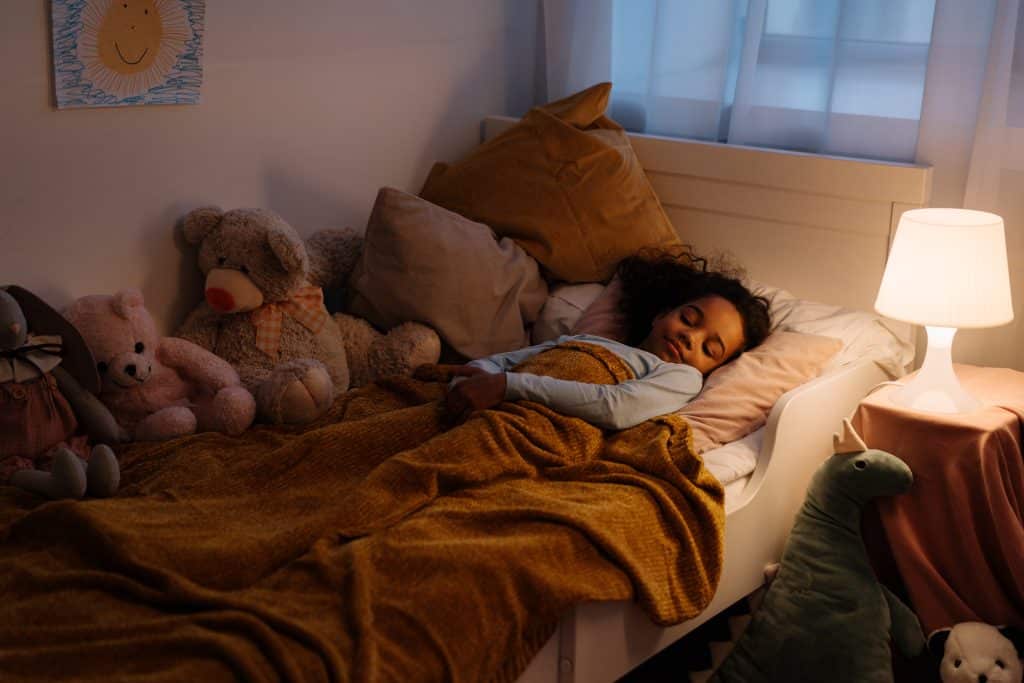As a licensed child development practitioner, I’ve worked with countless families and their little ones over the years. One of the most common questions I get from parents is about their toddlers talking in their Sleep. Can’t you picture your kids splashing around in that water park, giggling and chatting away as they drift off to dreamland? I know I can. But what’s really going on when our little ones start mumbling and babbling at 2 a.m.?
Table of Contents
What Does Toddler Sleep Talking Look Like?
During sleep talking, a child might:
- Sound like they’re awake
- Talk about events that aren’t happening
- Talk to someone who’s not in the room
- Mumble
- Shout
- Sing
- Laugh
- Make actual words
- Babble senselessly
- Make exclamations
- Make realistic cries of alarm or call for help
The content of their sleep talk can be wholly nonsensical or surprisingly coherent. They may seem distressed or amused, but most of the time, toddlers who are Sleep talking are not actually awake or aware of their surroundings.

Read more: How Many Hours of Sleep Do Kids Need?
What Causes Toddler Talking in Sleep?
There are a few potential reasons why toddlers may start talking in their Sleep:
Developmental Factors
Sleep talking is a normal part of a toddler’s development. As their brains mature and their sleep cycles become more established, the lines between wakefulness and Sleep can sometimes become blurred. This can lead to toddlers vocalizing their dreams or inner thoughts as they drift off to Sleep.
Stress and Anxiety
Stressful life events, like a new sibling, starting daycare, or even just a change in routine, can sometimes trigger more Sleep talking in toddlers. Their little brains are working overtime to process all the new information and stimuli, and this can manifest in more vocal Sleep.
Underlying Medical Conditions
In rare cases, sleep talking can be a symptom of an underlying medical condition, such as sleep apnea, gastroesophageal reflux disease (GERD), or even a neurological disorder. If the sleep talking is accompanied by other concerning symptoms, it’s a good idea to consult your child’s pediatrician.
Understanding Sleep Talking: The Basics
Sleep talking, also known as somniloquy, is a common sleep disorder that affects both children and adults. It occurs during the transition between sleep stages and can range from simple mumbling to full-blown conversations. But what causes sleep talking? Let’s take a closer look at some common factors.
| Factors | Explanation |
|---|---|
| Stress and anxiety | Emotional stress can lead to sleep disturbances, including sleep talking. |
| Fevers or illness | Physical discomfort can disrupt sleep and trigger sleep talking episodes. |
| Medications | Some medications can cause sleep disruptions, resulting in sleep talking. |
| Genetics | There may be a genetic predisposition to sleep talking in some families. |
| Sleep deprivation | Lack of sleep can lead to sleep disturbances, including sleep talking. |
Is Toddler Talking in Sleep Normal?
Toddler talking in Sleep is generally considered normal and common. According to the American Academy of Sleep Medicine, up to 50% of children experience some form of Sleep talking, with the highest prevalence between the ages of 3 and 10. [1] So if your little one is chattering away in the middle of the night, chances are, they’re just fine.

Read more: Does ADHD Affect Sleep?
When Should I Worry About Toddler Talking in Sleep?
In most cases, toddler talking in Sleep is nothing to worry about. It’s simply a regular part of their development. However, there are a few situations where you may want to bring it up with your pediatrician:
- If the Sleep talking is accompanied by other concerning symptoms, like difficulty breathing, restless Sleep, or daytime sleepiness
- If the sleep talking is persistent, disruptive, or seems to be causing distress for your child
- If you notice any changes in your child’s sleep patterns or behavior that concern you
Your pediatrician can help determine if the sleep talking indicates an underlying issue and recommend any necessary next steps.
How to Help a Toddler Talking in Their Sleep
In most cases, a toddler talking in Sleep requires no special treatment. Here are a few tips that may help:
Maintain a Consistent Bedtime Routine
Establishing a calming, predictable bedtime routine can help regulate your toddler’s sleep cycles and potentially reduce the frequency of Sleep talking. This could include a warm bath, reading a story, and cuddling before lights out.
Create a Soothing Sleep Environment
Ensuring your toddler’s bedroom is cool, dark, and quiet can also help promote better Sleep and minimize sleep disruptions. Consider using white noise, blackout curtains, or a nightlight if needed.
Manage Stress and Anxiety
If you suspect stress or anxiety are contributing to your toddler’s Sleep talking, try implementing calming techniques like deep breathing exercises, mindfulness activities, or gentle yoga before bed. You can also work with your pediatrician or a child therapist to address any underlying emotional or behavioral concerns.
The Bottom Line
At the end of the day, toddler talking in Sleep is usually nothing to worry about. It’s a normal, common, and often harmless part of your little one’s development. As long as they are getting adequate, restful Sleep, the occasional nighttime chatter is their way of processing the day’s adventures. So try not to stress too much, and enjoy those adorable, sleep-filled moments.
Helpful Resources
FAQ’s About Toddler Talking in Their Sleep
What is sleep talking in toddlers?
Sleep talking, also known as somniloquy, is a normal part of development where toddlers vocalize during their sleep. It's a common parasomnia that can occur as early as age 2 and continue into adolescence.
Is sleep talking in toddlers normal?
Yes, sleep talking is generally considered a normal and common phenomenon, with up to 50% of children experiencing it, especially between ages 3-10.
What causes toddlers to talk in their sleep?
The causes can include normal developmental factors, stress/anxiety, or in rare cases, underlying medical conditions like sleep apnea or GERD.
When should parents be concerned about toddler sleep talking?
Parents should consult a pediatrician if the sleep talking is accompanied by other concerning symptoms, is very frequent/disruptive, or if there are changes in the child's sleep patterns.
How can parents help toddlers who talk in their sleep?
Maintaining a consistent bedtime routine, creating a soothing sleep environment, and managing stress/anxiety can help minimize episodes of toddler sleep talking.
This post was originally published on 05/19/2023. It was updated on 04/17/2024.
Emily is a seasoned blog writer for Goally, leveraging her extensive background in child psychology and special education to provide valuable insights and resources for parents. Her commitment to understanding and addressing the unique needs of these children, combined with her expertise in educational strategies, makes her a credible and empathetic voice for families.







